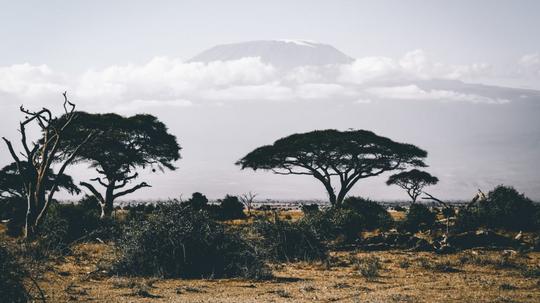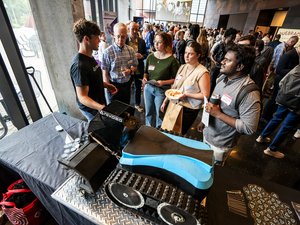
Kate Kuehl was in Kenya, studying abroad three years ago as a University of Minnesota student in food systems. She was surveying a woman – a farmer and a widow – about how much she invests in her land. The woman stopped her.
“She said this isn’t her biggest issue right now,” Kuehl recalled. “[She said], ‘I don’t own my land – I should, legally – but my family is trying to take it away.’”
Kuehl learned the problem is widespread. In Kenya, more than 80 percent of land is undocumented. The same is true for about 90 percent of land in countries in sub-Saharan Africa. Kenya is making progress, but it’s slow, she said. Inspired by the country’s adoption of mobile money systems, she wanted to approach the problem from a tech perspective, drawing on her long-time coding hobby.
“If you don’t have property rights, it’s really hard to develop an economy – a lot of economists have written about it,” Kuehl said. “The biggest asset they own is their land. … It’s hard to get investment if you’re not sure it’s yours. People won’t even plant trees.”
She returned to Minnesota, added computer science, applied economics, and international agriculture to her academic load, and made a map of her idea to digitize land rights, which would help bring accountability to a system often characterized by corruption. She co-founded Mobineo with Dave Okech, an entrepreneur from Kenya, who was a 2016 Mandela Washington Fellow at the University of Iowa John Pappajohn Entrepreneurial Center.
Mobineo, which combines the word “mobile” with the Swahili word for land, includes GPS, an app, website, and database, as well as training and consulting, with the goal to make the processes of land surveying, purchasing, and management more efficient.
The LLC is about three months away from its software launch. Kuehl, who was among Minne Inno’s 25 under 25 and won BizPitch and Entrepreneurship Student of the Year – two contests at the University of Minnesota – said Mobineo’s design has changed over time as the team incorporated input from surveyors, landowners, and local laws.
As the product nears completion, Mobineo is building connections with local organizations and leaders in Ghana, Kenya, and Zambia, among others, with the hope of setting up a pilot that will help shake out what works and what doesn’t. Countries like Kenya are already pouring millions of dollars into land documentation software. She believes Mobineo has a shot at landing contracts like that, providing a tool that would make it easier for local surveyors to do their jobs.
“We see ourselves as a software and consulting company,” Kuehl said. “We want to work with surveyors that exist. People within their culture can do this better.”
Mobineo isn’t the first company to consider a digital approach to surveying land and delineating land rights. But she hasn’t found one yet that she thinks works. So despite the years of trial and error as she learned how to lead a software team, she’s committing to pushing forward.
“For me, if the only impact I had in my life was Mobineo and getting people land rights, I’d be very happy,” Kuehl said. “That’s a good mission and it’s needed to lift people out of poverty.”








